#women education
Text

"I am Malala" by Malala Yousafzai book recommendation by Rachel Sylvan
#malala yousafzai#nobel peace prize#women education#girl education#book recommendations#books#book#book review#book rec#memoir#influential women#powerful women
10 notes
·
View notes
Text
Empowering Women: Unleashing the Force of Change
In a world where progress is measured by the empowerment of its people, the role of women stands as a critical cornerstone of societal advancement. Empowering women isn't merely about providing them with opportunities; it's about recognizing and unleashing the transformative potential that lies within each woman. From breaking barriers and challenging stereotypes to driving innovation and fostering inclusive societies, women empowerment is a catalyst for positive change across the globe.

Historically, women have faced systemic barriers that hindered their full participation in social, economic, and political spheres. Discriminatory practices, unequal access to education and employment, and gender-based violence have long impeded the progress of women in societies worldwide. However, despite these challenges, women have continually demonstrated resilience, courage, and determination in their pursuit of equality and empowerment.
Education serves as a cornerstone of women empowerment, providing them with the knowledge, skills, and confidence to pursue their aspirations and contribute meaningfully to society. By ensuring equal access to quality education for girls and women, we not only unlock their potential but also lay the groundwork for sustainable development and social progress. Education empowers women to challenge societal norms, pursue their passions, and become agents of change in their communities.
Moreover, economic empowerment is essential for women to achieve financial independence and break free from the cycle of poverty. Access to economic resources, including credit, land ownership, and entrepreneurial opportunities, enables women to support themselves and their families, invest in their futures, and contribute to economic growth and prosperity. By promoting women's entrepreneurship and leadership in business and industry, we can harness their talents and expertise to drive innovation, create jobs, and foster inclusive economic development.
Political empowerment is another crucial aspect of women empowerment, as it enables women to participate fully in decision-making processes and shape the policies that affect their lives. Through representation in political institutions, women can advocate for their rights, influence legislative agendas, and champion issues of gender equality and social justice. By promoting women's political participation and leadership at all levels of governance, we can create more inclusive and responsive democracies that reflect the diversity and voices of all citizens.
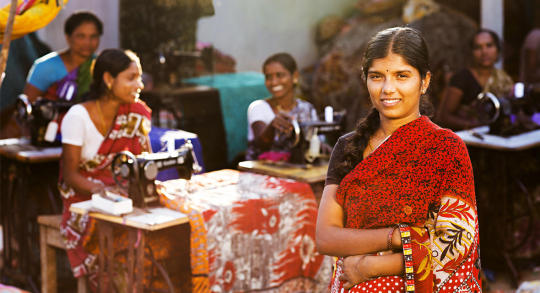
Beyond education, economics, and politics, women empowerment also encompasses the elimination of gender-based violence and discrimination. Violence against women remains a pervasive global issue, depriving women of their dignity, safety, and fundamental human rights. By challenging harmful gender norms, promoting gender equality, and implementing laws and policies that protect women from violence and discrimination, we can create safer and more equitable societies where women can thrive and fulfill their potential.
Cultural and social norms often perpetuate gender stereotypes and restrict women's freedom and agency. Empowering women requires challenging these norms and fostering environments where women are valued, respected, and treated as equals. By promoting gender-sensitive attitudes and behaviors, celebrating women's achievements, and amplifying their voices and stories, we can inspire future generations of women to dream big, defy expectations, and pursue their aspirations without fear or limitation.
In today's interconnected world, the empowerment of women is not only a matter of justice and human rights but also a prerequisite for sustainable development and global peace. When women are empowered, societies prosper, economies thrive, and communities flourish. By investing in women's education, economic opportunities, political participation, and safety, we invest in a brighter and more equitable future for all.
As individuals, communities, and nations, we must commit ourselves to the cause of women empowerment and work tirelessly to dismantle the barriers that stand in the way of women's progress. Let us celebrate the achievements of women past and present, amplify their voices, and champion their rights and aspirations. Together, let us build a world where every woman and girl can live with dignity, equality, and the freedom to pursue her dreams. For in empowering women, we empower humanity to reach its fullest potential and create a better world for generations to come.
3 notes
·
View notes
Text
How has the Taliban Controlled Women's Education in Afghanistan?
According to a recent BBC report, the Taliban has instructed the schools not to allow girls over the age of 10 to attend schools in Afghanistan. This development has come after a total ban on Afghanistan women’s receiving secondary education and attending colleges late last year. Since the withdrawal of US troops and the subsequent Taliban takeover of Afghanistan in August 2021, women have been…

View On WordPress
#afghan education#afghanstan#ban on education#ban on women&039;s education#education in afghanistan#human rights and taliban#right to free education#taliban#taliban ban on women&039;s education#taliban human rights issue#what are the taliban policies on women&039;s education?#women education#women&039;s education in afghansitan#women&039;s education in afghanstan
5 notes
·
View notes
Text
Bahuli, a broken Doll
Bahuli , doll in Marathi is just another broken doll with her loving and progressive father dreaming about educating her and setting an example of girls education in the society.
Kashibai Ghole the first female Martyr for women’s education
Today on Savitri Bai Phule’s birth anniversary, let’s all bow our heads to a small innocent girl who was all of 9 years when she became the first Martyr in…
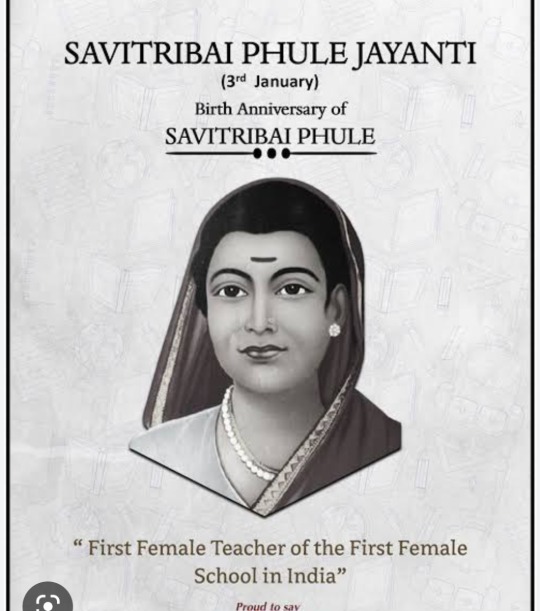
View On WordPress
3 notes
·
View notes
Text
3 notes
·
View notes
Text

Women's Self Help Groups near Me
Discover empowerment and support through The Power of the Heels women's self-help groups. Join us to connect with like-minded individuals, share experiences, and build resilience. Elevate your journey toward personal growth and fulfillment today. Visit us for more information.
0 notes
Text
Women's Not So Distant History
This #WomensHistoryMonth, let's not forget how many of our rights were only won in recent decades, and weren’t acquired by asking nicely and waiting. We need to fight for our rights. Here's are a few examples:

📍 Before 1974's Fair Credit Opportunity Act made it illegal for financial institutions to discriminate against applicants' gender, banks could refuse women a credit card. Women won the right to open a bank account in the 1960s, but many banks still refused without a husband’s signature. This allowed men to continue to have control over women’s bank accounts. Unmarried women were often refused service by financial institutions entirely.
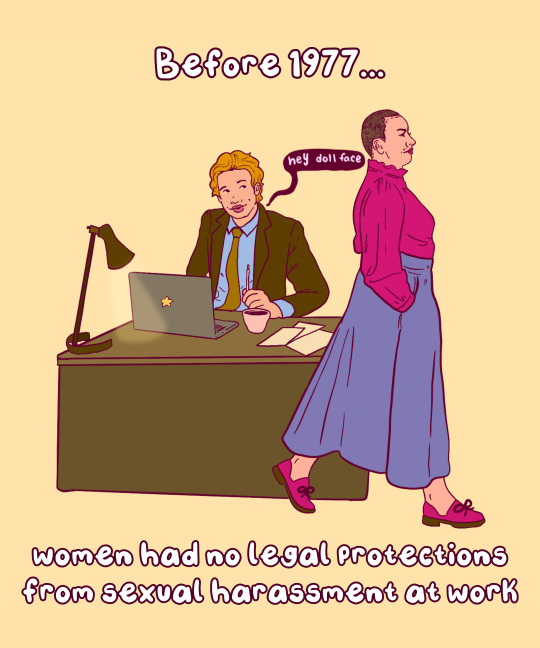
📍 Before 1977, sexual harassment was not considered a legal offense. That changed when a woman brought her boss to court after she refused his sexual advances and was fired. The court stated that her termination violated the 1974 Civil Rights Act, which made employment discrimination illegal.⚖️
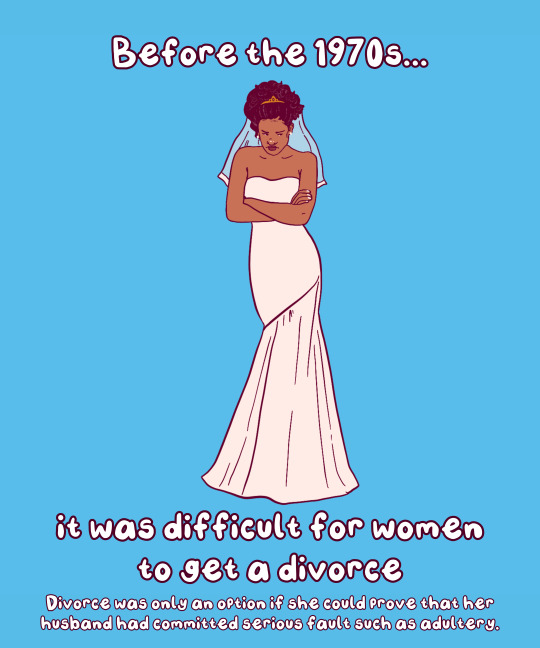
📍 In 1969, California became the first state to pass legislation to allow no-fault divorce. Before then, divorce could only be obtained if a woman could prove that her husband had committed serious faults such as adultery. 💍By 1977, nine states had adopted no-fault divorce laws, and by late 1983, every state had but two. The last, New York, adopted a law in 2010.
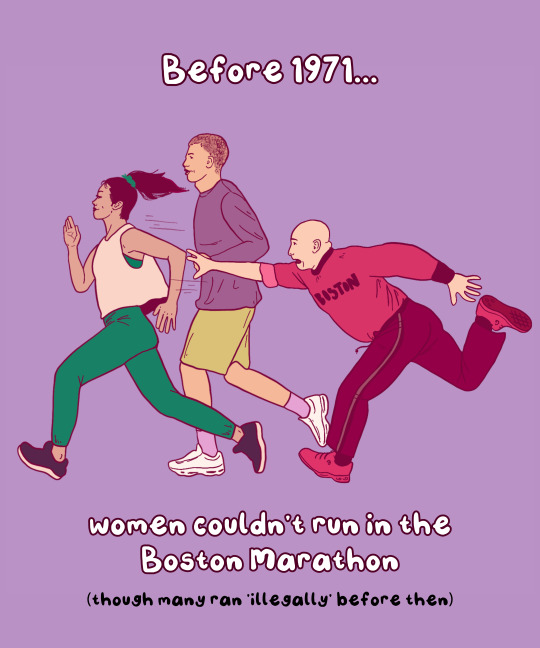
📍In 1967, Kathrine Switzer, entered the Boston Marathon under the name "K.V. Switzer." At the time, the Amateur Athletics Union didn't allow women. Once discovered, staff tried to remove Switzer from the race, but she finished. AAU did not formally accept women until fall 1971.

📍 In 1972, Lillian Garland, a receptionist at a California bank, went on unpaid leave to have a baby and when she returned, her position was filled. Her lawsuit led to 1978's Pregnancy Discrimination Act, which found that discriminating against pregnant people is unlawful
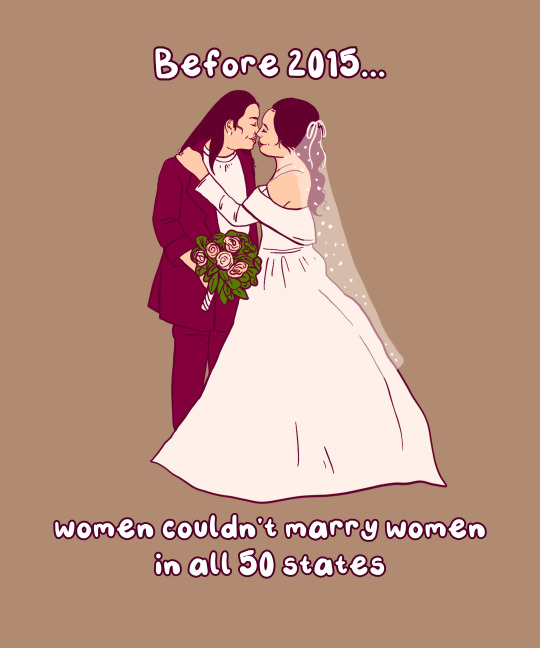
📍 It wasn’t until 2016 that gay marriage was legal in all 50 states. Previously, laws varied by state, and while many states allowed for civil unions for same-sex couples, it created a separate but equal standard. In 2008, California was the first state to achieve marriage equality, only to reverse that right following a ballot initiative later that year.

📍In 2018, Utah and Idaho were the last two states that lacked clear legislation protecting chest or breast feeding parents from obscenity laws. At the time, an Idaho congressman complained women would, "whip it out and do it anywhere,"
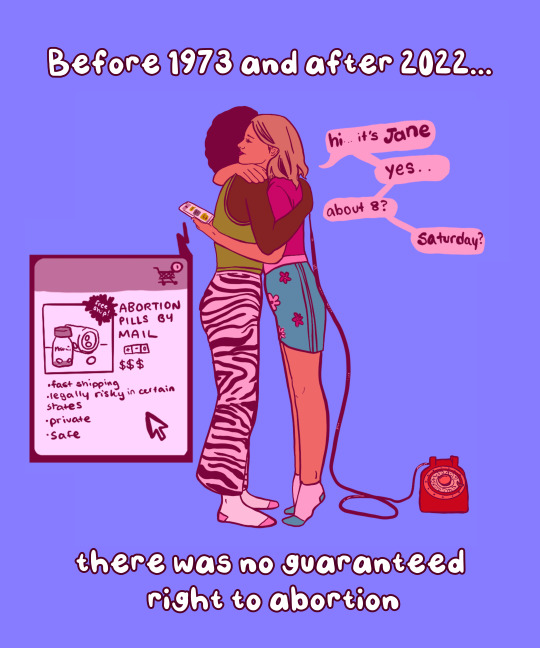
📍 In 1973, the Supreme Court affirmed the right to safe legal abortion in Roe v. Wade. At the time of the decision, nearly all states outlawed abortion with few exceptions. In 1965, illegal abortions made up one-sixth of all pregnancy- and childbirth-related deaths. Unfortunately after years of abortion restrictions and bans, the Supreme Court overturned Roe in 2022. Since then, 14 states have fully banned care, and another 7 severely restrict it – leaving most of the south and midwest without access.
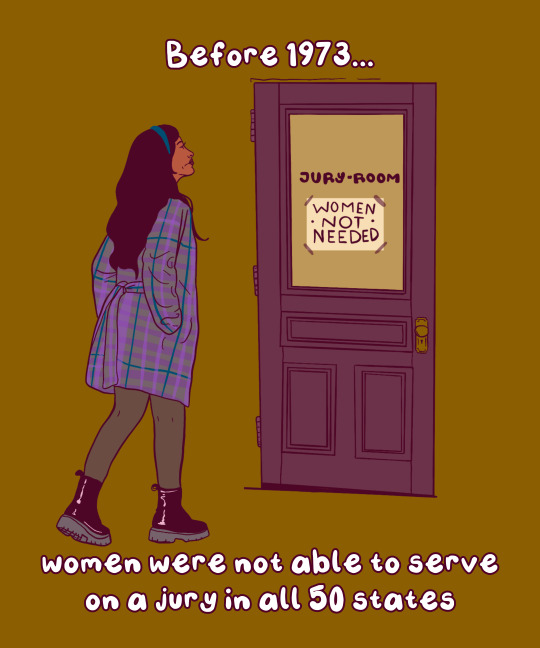
📍 Before 1973, women were not able to serve on a jury in all 50 states. However, this varied by state: Utah was the first state to allow women to serve jury duty in 1898. Though, by 1927, only 19 states allowed women to serve jury duty. The Civil Rights Act of 1957 gave women the right to serve on federal juries, though it wasn't until 1973 that all 50 states passed similar legislation

📍 Before 1988, women were unable to get a business loan on their own. The Women's Business Ownership Act of 1988 allowed women to get loans without a male co-signer and removed other barriers to women in business. The number of women-owned businesses increased by 31 times in the last four decades.
Free download
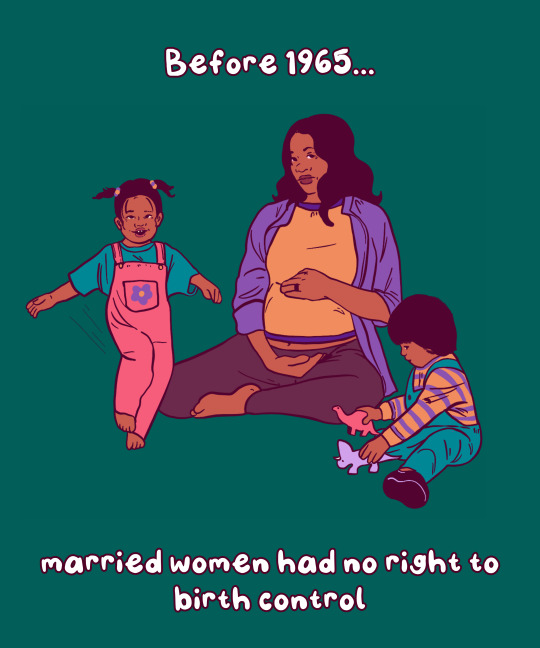
📍 Before 1965, married women had no right to birth control. In Griswold v. Connecticut (1965), the Supreme Court ruled that banning the use of contraceptives violated the right to marital privacy.

📍 Before 1967, interracial couples didn’t have the right to marry. In Loving v. Virginia, the Supreme Court found that anti-miscegenation laws were unconstitutional. In 2000, Alabama was the last State to remove its anti-miscegenation laws from the books.

📍 Before 1972, unmarried women didn’t have the right to birth control. While married couples gained the right in 1967, it wasn’t until Eisenstadt v. Baird seven years later, that the Supreme Court affirmed the right to contraception for unmarried people.
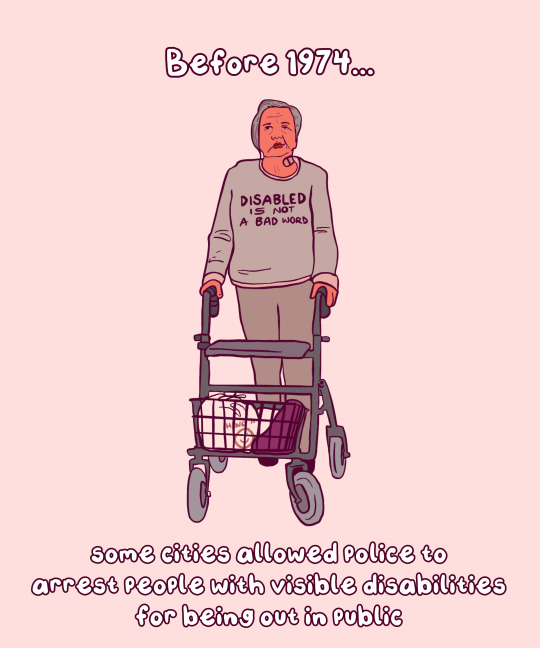
📍 In 1974, the last “Ugly Laws” were repealed in Chicago. “Ugly Laws” allowed the police to arrest and jail people with visible disabilities for being seen in public. People charged with ugly laws were either charged a fine or held in jail. ‘Ugly Laws’ were a part of the late 19th century Victorian Era poor laws.

📍 In 1976, Hawaii was the last state to lift requirements that a woman take her husband’s last name. If a woman didn’t take her husband’s last name, employers could refuse to issue her payroll and she could be barred from voting.

📍 It wasn’t until 1993 that marital assault became a crime in all 50 states. Historically, intercourse within marriage was regarded as a “right” of spouses. Before 1974, in all fifty U.S. states, men had legal immunity for assaults their wives. Oklahoma and North Carolina were the last to change the law in 1993.
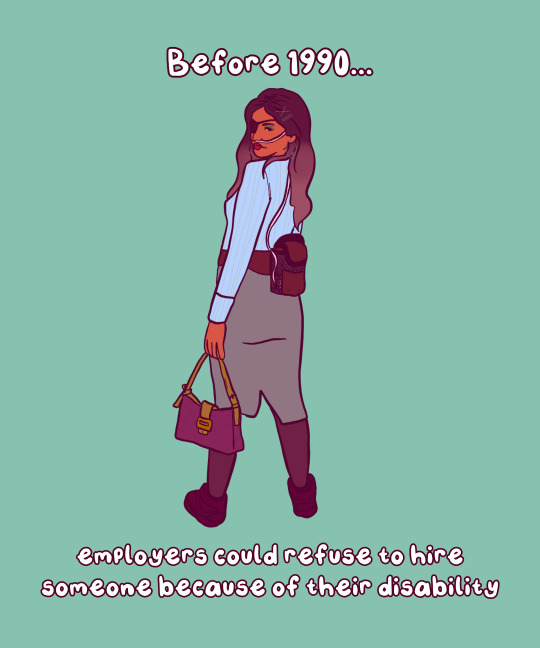
📍 In 1990, the Americans with Disability Act (ADA) – most comprehensive disability rights legislation in U.S. history – was passed. The ADA protected disabled people from employment discrimination. Previously, an employer could refuse to hire someone just because of their disability.

📍 Before 1993, women weren’t allowed to wear pants on the Senate floor. That changed when Sen. Moseley Braun (D-IL), & Sen. Barbara Mikulski (D-MD) wore trousers - shocking the male-dominated Senate. Their fashion statement ultimately led to the dress code being clarified to allow women to wear pants.

📍 Emergency contraception (Plan B) wasn't approved by the FDA until 1998. While many can get emergency contraception at their local drugstore, back then it required a prescription. In 2013, the FDA removed age limits & allowed retailers to stock it directly on the shelf (although many don’t).

📍 In Lawrence v. Texas (2003), the Supreme Court ruled that anti-cohabitation laws were unconstitutional. Sometimes referred to as the ‘'Living in Sin' statute, anti-cohabitation laws criminalize living with a partner if the couple is unmarried. Today, Mississippi still has laws on its books against cohabitation.
#art#feminism#women's history#women's history month#iwd2024#international women's day#herstory#educational#graphics#history#70s#80s#rights#women's rights#human rights
14K notes
·
View notes
Text

women's education is a fundamental driver of progress, contributing to gender equality, improved health, economic development, and personal empowerment. Read more: https://weeducation.ca/
1 note
·
View note
Text
#women#bd/sm mommy#best mommy#mommys little girl#mommysbaby#mommysprincess#new mom#newborn#newmommy#submisive and breedable#toddler#womenempowerment#women education
0 notes
Text

"Let Her Fly" by Ziauddin Yousafzai book recommendation by Rachel Sylvan
2 notes
·
View notes
Text
Women’s Education in Iraq: Challenges and Opportunities
Iraq is a country in the Middle East that has faced numerous challenges and political instability in recent decades. These challenges have resulted in significant setbacks for women's education, as traditional patriarchal norms and a lack of resources have made it difficult for women to access education. However, despite these challenges, there are still opportunities for women's education in Iraq. In this article, we will explore the challenges and opportunities facing women's education in Iraq and how these can be addressed.
Challenges facing women's education in Iraq
One of the biggest challenges facing women's education in Iraq is a lack of resources. The country has faced significant economic difficulties in recent years, and this has resulted in limited funding for education. As a result, many schools lack basic resources, such as textbooks, computers, and other essential learning materials. This lack of resources has a particularly significant impact on girls' education, as girls are often the first to be excluded from education when resources are limited.
Another significant challenge facing women's education in Iraq is cultural and societal norms that prioritize male education. Traditional patriarchal norms have long held sway in Iraq, and many families continue to believe that education is more important for their sons than their daughters. This attitude is reflected in the lower enrollment rates for girls in primary and secondary schools. Furthermore, many girls are forced to leave school early to take on household responsibilities or marry at a young age.
A lack of safety is another significant challenge facing women's education in Iraq. The country has faced ongoing conflict and political instability in recent years, and this has created an unsafe environment for students and teachers alike. Girls are often targeted for violence or abduction on their way to school, and schools themselves are sometimes targeted for attack. This has led many parents to keep their daughters at home, fearing for their safety.
Opportunities for women's education in Iraq
Despite these challenges, there are still opportunities for women's education in Iraq. One of the most significant opportunities is the government's commitment to education. The Iraqi government has recognized the importance of education for the country's future, and it has taken steps to improve access to education for all. This includes increasing funding for education and building new schools in underserved areas. These efforts have helped to increase enrollment rates for both boys and girls.
Another significant opportunity for women's education in Iraq is the growing availability of technology. While many schools in Iraq lack basic resources, access to technology has increased in recent years. This has opened up new opportunities for distance learning, online courses, and other forms of education that can reach students in remote or underserved areas. This is particularly important for girls, who may face more significant barriers to accessing traditional schools.
Finally, there is a growing awareness of the importance of women's education in Iraq. This has been driven by both government and civil society organizations, which have worked to promote gender equality and challenge traditional patriarchal norms. This awareness has led to new initiatives to support girls' education, including scholarships and mentorship programs. These initiatives can help to break down some of the barriers facing girls in accessing education.
Addressing the challenges and seizing the opportunities
To address the challenges facing women's education in Iraq and seize the opportunities available, there are several steps that can be taken. First and foremost, there needs to be a greater investment in education from the government and private sector. This includes increasing funding for schools, providing resources and infrastructure, and promoting teacher training and development. A greater focus on education can help to ensure that all children, regardless of gender, have access to the knowledge and skills they need to thrive.
Second, there needs to be a concerted effort to challenge traditional patriarchal norms and promote gender equality. This includes working with families and communities to address the attitudes that prioritize male education, and promoting the importance of education for girls. It also means
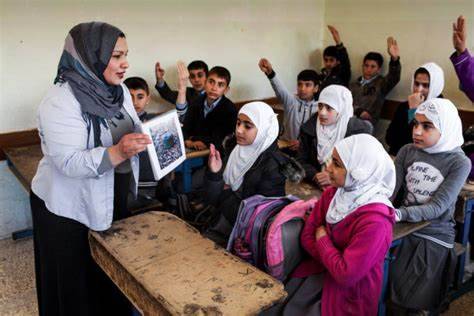
1 note
·
View note
Text
Education is the first step toward women's emancipation

According to research, more than 30 girls leave school before the tenth grade. Here are some ways that education might help women in our nation become more empowered.
By definition, empowerment is the act of giving someone the ability to do a variety of tasks or responsibilities, as well as the state of having these abilities.
Empowerment is the process of enabling or approving someone to think, act, perform, and take charge of their personal or professional lives independently, as the word's literal definition suggests. offering the freedom to behave normally, to put it another way.
Even while this assertion is powerful in and of itself, it does not accurately reflect the actuality or lack thereof.
The secret to empowerment is education.
Every civilization contains communities, factions, or groups that are denied or suppressed from exercising their fundamental rights, but these elements share one thing in common, which is that neither they nor some of the "dominant" people of that society are aware of their rights.
However, for a significant portion of human history, women have been the main targets of this denial of fundamental rights in the majority of societies.
Women have historically been on the "far" end of this spectrum when it comes to rights such as the right to life and liberty, freedom of thought and expression, and the right to employment and education.
The foundation of all forms of empowerment is knowledge and awareness. Because of the development in education, the tendency to emancipate women's civil and human rights is progressively waning.
However, a sizable portion of societies, cultures, or individuals continue to adhere to this antiquated viewpoint regarding female empowerment or education.
Need for education
The United Nations reports that over 274 regulatory measures supporting gender equality have been implemented by 131 nations. Women's engagement in urban industries has increased in India, yet the situation still seems bleak.
Increased involvement does not imply equitable representation, necessarily. Despite making up over 40% of the agricultural workforce, women only own or control 10% of the land. They are left out of the official economy, which emphasises how exploitative our society is and how it is built on gender bias.
The education of women is still viewed negatively. According to the United Nations, girls' rates of continued enrolment begin to drastically fall after they enter secondary school. Equal numbers of boys and girls are enrolled in secondary education in only 39% of the countries.
Due to the fact that between 35% and 85% of girls in underdeveloped nations are compelled to remain home from school to care for their younger siblings or the household, female student attrition rates are significantly greater than those of male students.
Gender roles contributing to illiteracy
In our society, males are expected to take care of the household's financial needs, while women are expected to shoulder all emotional duties.
The majority of the time, this naturally establishes a hierarchy and veneration of the money creator, which causes domestic violence, primarily against women, which is the main source of frustrations and traumas.
Women can break this social cycle by becoming financially independent and developing the skills necessary to stand beside the opinionated moneymaker. This empowers them to leave the house and pursue their own interests rather than remaining confined to household duties.
The education of women is essential to the nation's overall growth. It is reasonable to think of this education as the creation of 50 percent of a society's or a country's human resources.
This comparison aids in comprehending the significance of female empowerment and education in raising the standard of living at home, abroad, or even inside a nation.
0 notes
Text
Jijabai, the Political Strategist
The name Jijabai and Shivaji Raje is so convoluted and impenetrable , that sieving her from her illustrious son is like the process of winnowing.
Jijamata, Rajmata 🙏🙏
Despite jijabai being acknowledged as jijamata and the architect of her son shivaji ascent to the maratha throne , the aspect that jijabai was one of the first female political leader is something to be cherished and…
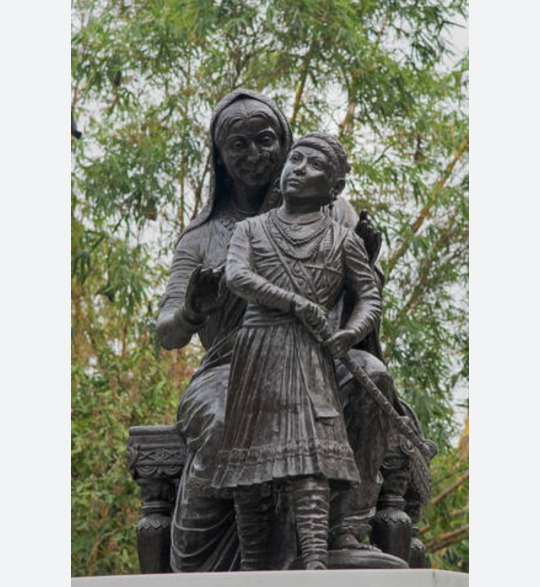
View On WordPress
#feminist#History#Jijabai#parents#Political strategies#Shivaji Maharaj#Women Education#Women Empowerment
5 notes
·
View notes
Text
Factors That Hinder Children’s Education: Root Causes and How to Overcome Them
There are several factors that can hinder a child's education, including poverty, lack of access to educational resources, limited English proficiency, cultural and linguistic barriers, and inadequate teaching quality. The root cause of these challenges is often systemic, such as underfunding of schools in low-income areas, cultural biases in the education system, and a lack of teacher training and support.
To overcome these barriers, a multi-faceted approach is needed that addresses both the individual needs of children and the larger systemic issues. This can include providing access to educational resources, such as books and technology, as well as programs that help children improve their language and literacy skills. Additionally, investing in teacher training and support can help ensure that teachers are equipped with the skills they need to effectively educate all children, regardless of their background. Additionally, addressing poverty through initiatives such as affordable housing, access to healthcare, and employment opportunities can help create more supportive environments for children and families.
1 note
·
View note
Text
Women's Self-Help Groups Near Me
Looking for women's self-help groups near you? Check out The Power of the Heels organization. Empowering women through support, networking, and skill-building. Join us to unleash your potential and embrace your strengths. Connect with like-minded individuals today!
0 notes
Text
i had a friend who was raped as a teenager and had a really strict mum who did not let her go out so she was really lonely. when she turned 18 she started going clubbing and since we live in a city with a big fetish scene, she started going to the kinky venue. since she was young, naive and very pretty, she was immediately roped in by older men who did bondage shootings with her and everything. she started working in the club. to me, she was clearly groomed, but she works in a fetish shop now and is fully immersed in the scene
i have a friend who answered a job ad for a secretary when she was abroad and she and her friend ran out of money but when they arrived there it was a brothel. they both prostituted themselves for several months. they were only 18. she still talks highly of that brothel, how clean and safe it was, and wants prostitution to be legal
i read the gut wrenching biography of a thai woman who ran away from home, whose parents refused her education and treated her brother very preferably while openly hating her, and entered prostitution in sex tourist destination pattaya at only 13. she was paid by men in their 50s first for her virginity, then to piss on her. she exited at 19 and developed psychosis. she defends sex buyers, hates feminists and wants prostitution to be legal
do you see where im going with this? brainwashing is real. despite the obvious facts, the grooming, the system that pushed and pulled them, the men taking advantage of them; they defend it. so yeah, we shouldnt dismiss firsthand testimony and personal experience, but always take it with a grain of salt, always contextualise, always see it as one part of a bigger picture. liberals dont do that and have duped too many people into not doing it either. „if thats her choice its none of our business“ fuck you!
#there are so many more examples from the women in the sex industry who defend it in my notes alone#mine#there were and are women who dont want women to have the right to education to vote to work etc#even if it was denied to them as well#the thing is no group is a monolith and you cant just say ‚listen to x group‘ because#there will be differences within x group so you need to form your own opinion#based on all the information you can geg
1K notes
·
View notes